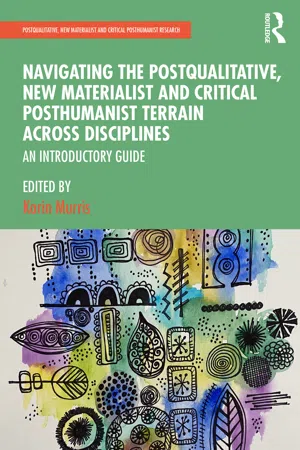
Navigating the Postqualitative, New Materialist and Critical Posthumanist Terrain Across Disciplines
An Introductory Guide
- 196 pages
- English
- ePUB (mobile friendly)
- Available on iOS & Android
Navigating the Postqualitative, New Materialist and Critical Posthumanist Terrain Across Disciplines
An Introductory Guide
About This Book
Navigating the Postqualitative, New Materialist and Critical Posthumanist Terrain Across Disciplines is an accessible introductory guide to theories, paradigm shifts and key concepts in postqualitative, new materialist and critical posthumanist research.
Supported by its own website, this first book in a larger series is an essential companion to the primary texts and original sources of the theorists discussed in this and other books in the series. Disrupting the theory/practice divide, the book offers a postqualitative reimagining of traditional research processes. In doing so, it guides readers through the contestation of binaries, innovative concepts, and the practical provocations that make up the postqualitative terrain. It orients the researcher in the ontological re-turn also by considering Indigenous knowledges, African, Eastern and young children's philosophies. The style itself is postqualitative through diffractive engagements by the authors and the website includes some examples of the practical provocations described in the book that give an imaginary of how postqualitative research can be taught and enacted.
This book is an essential resource for novice as well as experienced researchers working both within and across disciplines in higher education.
More information and pocasts for this book can be found at
https://postqualitativeresearch.com/series-overview/navigating-the-postqualitative-new-materialist-and-critical-posthumanist-terrain-across-disciplines-an-introductory-guide-2/
Frequently asked questions
Information
1
Knowledge matters
Five propositions concerning the reconceptualisation of knowledge in feminist new materialist, posthumanist and postqualitative approaches
- How feminist new materialist, posthumanist and postqualitative approaches conceptualise knowledge, knowledge-making and the knowing subject;
- Why these new conceptualisations of knowledge matter; and
- How they make a difference to research and pedagogy.
Introduction
- How feminist new materialist, posthumanist and postqualitative approaches conceptualise knowledge, knowledge-making and the knowing subject;
- Why these new conceptualisations of knowledge matter; and
- How they make a difference to research and pedagogy.
Table of contents
- Cover
- Half Title
- Series Page
- Title Page
- Copyright Page
- Dedication
- Table of Contents
- List of Figures and Tables
- Acknowledgements
- List of Contributors
- Introduction Making Kin: Postqualitative, New Materialist and Critical Posthumanist Research
- Chapter 1: Knowledge matters: Five propositions concerning the reconceptualisation of knowledge in feminist new materialist, posthumanist and postqualitative approaches
- Chapter 2: What paradigmatic perspectives make possible: Considerations for pedagogies and the doing of inquiry
- Chapter 3: The ‘Missing Peoples’ of critical posthumanism and new materialism
- Chapter 4: Eastern ethico-onto-epistemologies as a diffracting return: Implications for post-qualitative pedagogy and research
- Chapter 5: A new science of contemporary educational theory, practice and research
- Chapter 6: Re-turning to embodied matters and movement
- Chapter 7: Rendering each other capable: Doing response-able research responsibly
- Chapter 8: Reanimating video and sound in research practices
- Chapter 9: Rethinking research ‘use’: Reframing impact, engagement and activism with feminist new materialist, posthumanist and postqualitative research
- Index